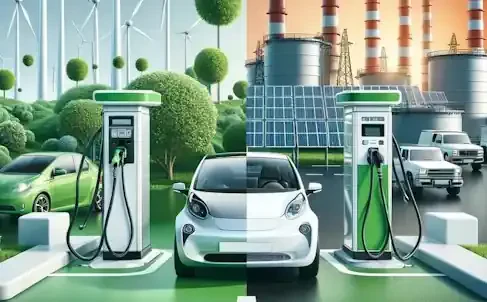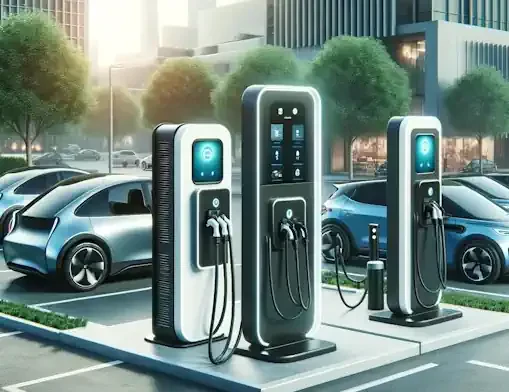Introduction
Electric vehicles (EVs) have emerged as a transformative force in the automotive industry, representing a significant shift towards sustainable transportation solutions. With concerns over climate change, air pollution, and energy security becoming increasingly pressing, the adoption of EVs has gained momentum worldwide. In this article, we delve into the multifaceted advantages of driving electric vehicles, highlighting their environmental, economic, social, and technological benefits.
Environmental Benefits
Electric vehicles offer a compelling solution to mitigate the environmental impacts associated with traditional internal combustion engine vehicles. One of the most significant advantages of EVs is their contribution to reducing greenhouse gas emissions. Unlike conventional vehicles that rely on fossil fuels, EVs operate primarily on electricity, which can be generated from renewable sources such as wind, solar, and hydroelectric power. By transitioning to electric propulsion, drivers can significantly decrease their carbon footprint, thereby helping to combat climate change.
Moreover, electric vehicles play a crucial role in reducing air pollution, particularly in densely populated urban areas where vehicle emissions pose significant health risks. The absence of tailpipe emissions from EVs means cleaner air for everyone, leading to improvements in public health and quality of life. Studies have shown that widespread adoption of electric vehicles could substantially reduce harmful pollutants such as nitrogen oxides (NOx), particulate matter (PM), and volatile organic compounds (VOCs), which are known to cause respiratory illnesses and exacerbate environmental degradation.
In addition to mitigating air pollution, electric vehicles contribute to the conservation of natural resources. The extraction and combustion of fossil fuels for transportation purposes have led to depletion of finite resources and environmental degradation. By transitioning to electric mobility, society can reduce its reliance on non-renewable resources such as oil and gas, thereby preserving ecosystems and biodiversity. Furthermore, the energy efficiency of electric vehicles, coupled with advancements in battery technology, ensures optimal utilization of resources and minimizes waste throughout the vehicle's lifecycle.
In summary, the environmental benefits of driving electric vehicles are substantial and far-reaching. From reducing greenhouse gas emissions and improving air quality to conserving natural resources, EVs offer a sustainable alternative to conventional transportation that aligns with global efforts to combat climate change and promote environmental stewardship. As we continue to embrace electric mobility, the positive environmental impacts will become increasingly evident, paving the way for a cleaner, greener future.
Cost Savings
Transitioning to electric vehicles not only benefits the environment but also offers significant cost savings for drivers. One of the most compelling advantages is the reduction in fuel expenses. Unlike traditional gasoline or diesel vehicles, which are subject to fluctuating fuel prices, electric vehicles rely on electricity, which tends to be more stable and often cheaper per mile traveled. As a result, EV owners can enjoy substantial savings on their annual fuel costs, especially as the cost of electricity continues to decline due to advancements in renewable energy technology and grid efficiency.
Furthermore, electric vehicles are inherently simpler in design and have fewer moving parts compared to internal combustion engine vehicles. This translates to lower maintenance costs over the lifetime of the vehicle. EVs do not require oil changes, tune-ups, or exhaust system repairs, resulting in fewer visits to the mechanic and reduced maintenance expenses. Additionally, regenerative braking systems employed in many electric vehicles help to prolong the lifespan of brake pads and reduce wear and tear on braking components, further lowering maintenance costs.
Beyond day-to-day operational savings, electric vehicle owners may also benefit from various financial incentives and tax credits offered by governments to promote clean transportation. These incentives can include rebates for purchasing or leasing an electric vehicle, tax credits for installing home charging stations, and exemptions from vehicle registration fees or tolls. By taking advantage of these incentives, drivers can offset the upfront costs of purchasing an electric vehicle and enjoy long-term financial benefits.
In addition to direct cost savings, electric vehicles hold their value well over time, thanks to their increasingly mainstream appeal and the growing demand for environmentally friendly transportation options. As consumer preferences shift towards sustainability and emissions reduction, resale values of electric vehicles are expected to remain strong, providing owners with a higher return on investment compared to traditional vehicles.
In conclusion, the cost savings associated with driving electric vehicles extend beyond the pump, encompassing reduced maintenance expenses, government incentives, and strong resale values. As electric vehicle technology continues to advance and economies of scale drive down production costs, the financial advantages of EV ownership will become even more compelling, making electric mobility an increasingly attractive option for drivers seeking both environmental and economic sustainability.
Performance and Driving Experience
Electric vehicles offer a superior driving experience characterized by smooth acceleration, responsive handling, and quiet operation. One of the key advantages of EVs is their instant torque delivery, which provides exhilarating acceleration from a standstill. Unlike internal combustion engines that require time to build up power, electric motors deliver maximum torque instantaneously, resulting in rapid acceleration and seamless power delivery. This responsiveness not only enhances the driving experience but also improves overall vehicle performance, particularly in urban environments where quick acceleration and maneuverability are essential.
Furthermore, electric vehicles are renowned for their quiet operation, creating a serene driving environment free from the noise and vibrations associated with traditional vehicles. The absence of an internal combustion engine eliminates engine noise, allowing occupants to enjoy a peaceful ride and reducing noise pollution in urban areas. This quietness enhances comfort and reduces driver fatigue, making electric vehicles an ideal choice for long commutes or road trips.
In addition to their performance advantages, electric vehicles offer superior handling and driving dynamics due to their low center of gravity and balanced weight distribution. The placement of heavy battery packs along the vehicle's floor lowers its center of gravity, resulting in improved stability and cornering capabilities. This translates to a more agile and responsive driving experience, with electric vehicles exhibiting minimal body roll and precise steering control.
Moreover, advancements in electric vehicle technology, such as regenerative braking systems and adaptive cruise control, enhance safety and convenience on the road. Regenerative braking harnesses kinetic energy during deceleration and stores it in the vehicle's battery, improving energy efficiency and extending driving range. Meanwhile, features like adaptive cruise control utilize sensors and artificial intelligence to maintain a safe distance from other vehicles, reducing the likelihood of accidents and enhancing driver confidence.
In summary, electric vehicles offer a superior driving experience characterized by instant torque, quiet operation, and responsive handling. From rapid acceleration to precise steering control, EVs deliver performance advantages that rival or exceed those of traditional vehicles. As electric vehicle technology continues to evolve, drivers can expect further enhancements in performance, safety, and driving dynamics, making electric mobility an increasingly compelling choice for discerning consumers.
Energy Independence and Security
Electric vehicles play a crucial role in promoting energy independence and security by reducing dependence on imported oil and diversifying energy sources. Unlike conventional vehicles that rely on gasoline or diesel derived from fossil fuels, electric vehicles can be powered by domestically produced electricity generated from a variety of sources, including renewable energy such as wind, solar, and hydroelectric power.
By transitioning from fossil fuel-powered transportation to electric mobility, nations can decrease their reliance on imported oil, thereby enhancing energy security and reducing vulnerability to geopolitical tensions and supply disruptions. This reduction in oil dependence not only mitigates economic risks associated with fluctuating oil prices but also strengthens national sovereignty and resilience in the face of global energy challenges.
Moreover, the integration of renewable energy sources into the electric vehicle ecosystem further enhances energy independence and security by diversifying the energy mix and reducing reliance on finite resources. Renewable energy technologies such as solar panels and wind turbines harness the abundant and freely available energy of the sun and wind, providing a sustainable alternative to fossil fuels. By coupling electric vehicle adoption with renewable energy deployment, nations can create a more resilient and decentralized energy infrastructure that is less susceptible to supply chain disruptions and price volatility.
Furthermore, the electrification of transportation facilitates the integration of electric vehicles into smart grid systems, enabling more efficient management of energy resources and optimizing grid stability. Vehicle-to-grid (V2G) technology allows electric vehicles to serve as mobile energy storage units, capable of both drawing power from and supplying power to the grid as needed. This bidirectional flow of electricity enhances grid flexibility and resilience, facilitating the integration of variable renewable energy sources and reducing the need for costly grid upgrades.
In summary, electric vehicles contribute to energy independence and security by reducing dependence on imported oil, diversifying energy sources, and enhancing grid flexibility and resilience. By embracing electric mobility and renewable energy integration, nations can strengthen their energy sovereignty, mitigate geopolitical risks, and build a more sustainable and resilient energy future.
Health Benefits
In addition to their environmental and economic advantages, electric vehicles offer significant health benefits for both individuals and communities. One of the most notable health benefits of EVs is the reduction of air pollution, particularly in urban areas where vehicular emissions contribute to poor air quality and respiratory illnesses. Unlike internal combustion engine vehicles, which emit pollutants such as nitrogen oxides (NOx), particulate matter (PM), and volatile organic compounds (VOCs), electric vehicles produce zero tailpipe emissions, thereby improving local air quality and reducing public exposure to harmful pollutants.
Studies have consistently shown that exposure to air pollution is associated with a wide range of adverse health effects, including respiratory diseases, cardiovascular disorders, and even premature death. By transitioning to electric mobility, societies can mitigate these health risks and improve public health outcomes, particularly among vulnerable populations such as children, the elderly, and individuals with preexisting respiratory conditions. Cleaner air resulting from widespread electric vehicle adoption can lead to reductions in hospital admissions, emergency room visits, and healthcare expenditures related to air pollution-related illnesses.
Furthermore, electric vehicles contribute to noise pollution mitigation, creating quieter and more livable urban environments. The absence of internal combustion engine noise in EVs results in quieter streets, reducing stress levels and improving overall quality of life for residents. This reduction in noise pollution has tangible health benefits, as chronic exposure to excessive noise has been linked to various health issues, including sleep disturbances, hypertension, and cognitive impairment.
Moreover, the health benefits of electric vehicles extend beyond individual well-being to broader societal impacts. By reducing air and noise pollution, electric vehicles help to create healthier and more equitable communities, where all residents can enjoy cleaner air, quieter streets, and improved quality of life. These health benefits contribute to the overall social and economic prosperity of cities and regions, attracting businesses, investment, and talent while fostering a sense of community and well-being among residents.
In summary, electric vehicles offer substantial health benefits by reducing air and noise pollution, improving public health outcomes, and creating healthier and more livable communities. By embracing electric mobility and prioritizing clean transportation solutions, societies can protect human health, enhance quality of life, and promote social and environmental justice for current and future generations.
Technological Advancements
Electric vehicles are at the forefront of technological innovation, driving advancements in battery technology, charging infrastructure, and vehicle connectivity. One of the key areas of innovation in electric vehicles is battery technology, which continues to evolve rapidly, leading to improvements in energy density, charging speed, and overall performance. Advances in battery chemistry and manufacturing processes have resulted in lithium-ion batteries that are lighter, more compact, and more energy-efficient, enabling longer driving ranges and faster charging times for electric vehicles.
Moreover, the expansion of charging infrastructure is essential for the widespread adoption of electric vehicles and is a focal point of technological innovation in the EV ecosystem. Governments, automakers, and energy companies are investing in the development of public charging networks, fast-charging stations, and smart grid solutions to support the growing demand for electric mobility. These efforts aim to increase the convenience and accessibility of charging infrastructure, thereby alleviating range anxiety and accelerating the transition to electric vehicles.
In addition to advancements in battery technology and charging infrastructure, electric vehicles are driving innovation in vehicle connectivity and autonomous driving technologies. Many modern EVs are equipped with advanced driver-assistance systems (ADAS), such as adaptive cruise control, lane-keeping assistance, and automated parking, which improve safety, convenience, and driver comfort. Furthermore, electric vehicles are paving the way for autonomous driving capabilities, with manufacturers investing heavily in research and development to achieve fully autonomous operation in the near future.
The integration of electric vehicles with emerging technologies such as artificial intelligence (AI), machine learning, and Internet of Things (IoT) is opening up new possibilities for vehicle customization, predictive maintenance, and fleet management. Electric vehicle manufacturers are leveraging data analytics and telematics to optimize vehicle performance, diagnose issues remotely, and deliver over-the-air software updates, enhancing the user experience and reducing downtime.
In summary, electric vehicles are driving technological advancements in battery technology, charging infrastructure, vehicle connectivity, and autonomous driving, ushering in a new era of innovation and mobility. As electric vehicle technology continues to mature and evolve, we can expect further breakthroughs in energy storage, charging speed, and vehicle intelligence, paving the way for a smarter, greener, and more connected transportation future.
Contribution to Climate Change Mitigation
Electric vehicles play a critical role in mitigating climate change by reducing greenhouse gas emissions and promoting the transition to renewable energy sources. As the transportation sector is a significant contributor to global carbon dioxide (CO2) emissions, the widespread adoption of electric vehicles represents a crucial strategy for decarbonizing the economy and achieving climate goals.
One of the primary advantages of electric vehicles in mitigating climate change is their lower carbon footprint compared to traditional internal combustion engine vehicles. By running on electricity instead of gasoline or diesel, EVs produce zero tailpipe emissions, resulting in significantly lower CO2 emissions per mile traveled, especially when powered by renewable energy sources. Studies have shown that electric vehicles can reduce greenhouse gas emissions by up to 50% or more compared to conventional vehicles, depending on the electricity mix used for charging.
Moreover, the integration of electric vehicles with renewable energy sources such as wind, solar, and hydroelectric power further enhances their climate mitigation potential. By charging electric vehicles with clean, renewable electricity, societies can achieve carbon neutrality in transportation, effectively eliminating emissions from the sector and contributing to overall emissions reductions. This synergy between electric vehicles and renewable energy is crucial for achieving long-term climate goals and transitioning to a low-carbon economy.
Furthermore, electric vehicles serve as catalysts for broader decarbonization efforts by driving demand for renewable energy and accelerating the transition away from fossil fuels. As the market share of electric vehicles continues to grow, so too does the demand for clean electricity generation, prompting investments in renewable energy infrastructure and grid modernization. This virtuous cycle reinforces the shift towards renewable energy and creates positive feedback loops that drive further emissions reductions across multiple sectors of the economy.
In summary, electric vehicles play a vital role in mitigating climate change by reducing greenhouse gas emissions, promoting renewable energy adoption, and accelerating the transition to a low-carbon economy. By embracing electric mobility and transitioning to clean, renewable energy sources, societies can achieve significant emissions reductions and contribute to global efforts to address the urgent challenge of climate change.
Social and Economic Impacts
The adoption of electric vehicles has wide-ranging social and economic impacts, including job creation, income equality, and the promotion of sustainable transportation solutions. One of the most significant social benefits of electric vehicles is the creation of new job opportunities in the burgeoning EV industry. As electric vehicle manufacturing, infrastructure development, and research and development continue to expand, so too does the demand for skilled workers in areas such as engineering, manufacturing, and technology. This job growth stimulates economic activity, creates pathways to employment, and fosters innovation and entrepreneurship in the clean transportation sector.
Furthermore, the transition to electric mobility has the potential to reduce income inequality by providing equitable access to clean transportation solutions. Electric vehicles offer lower operating costs and reduced reliance on fossil fuels, making them more affordable and accessible to a broader range of consumers, including low- and middle-income households. Government incentives and subsidies for electric vehicle adoption can further enhance affordability and facilitate the transition to electric mobility for underserved communities, thereby reducing disparities in transportation access and improving social equity.
Moreover, the widespread adoption of electric vehicles contributes to the promotion of sustainable transportation solutions that prioritize environmental stewardship, public health, and community well-being. By reducing air and noise pollution, electric vehicles create healthier and more livable urban environments, where residents can enjoy cleaner air, quieter streets, and enhanced quality of life. Electric mobility also supports efforts to reduce traffic congestion, improve road safety, and enhance public transit systems, leading to more efficient and sustainable transportation networks for all.
In addition to social benefits, electric vehicles offer significant economic opportunities for businesses, governments, and individuals alike. By reducing dependence on imported oil and promoting domestic energy production, electric vehicles enhance energy security and resilience, thereby reducing economic vulnerabilities and promoting long-term prosperity. Moreover, the electrification of transportation opens up new markets for renewable energy deployment, grid modernization, and clean technology innovation, driving economic growth and job creation in sectors critical to the transition to a sustainable energy future.
In summary, electric vehicles have profound social and economic impacts, including job creation, income equality, and the promotion of sustainable transportation solutions. By embracing electric mobility and investing in clean transportation infrastructure, societies can unlock economic opportunities, improve social equity, and build more resilient and prosperous communities for current and future generations.
Conclusion Benefits of Driving an Electric Vehicle
Electric vehicles represent a paradigm shift in transportation, offering a multitude of advantages that extend beyond individual drivers to society as a whole. From environmental benefits such as reduced greenhouse gas emissions and improved air quality to economic advantages such as cost savings and job creation, electric vehicles are reshaping the automotive industry and driving the transition to a sustainable future.
The environmental benefits of electric vehicles are undeniable, with zero tailpipe emissions helping to mitigate climate change, reduce air pollution, and conserve natural resources. These environmental advantages not only improve public health and quality of life but also contribute to broader efforts to address the urgent challenge of climate change and promote environmental sustainability.
Moreover, the economic benefits of electric vehicles are equally compelling, with lower fuel and maintenance costs, government incentives, and job creation driving economic growth and prosperity. By embracing electric mobility and investing in clean transportation infrastructure, societies can unlock economic opportunities, improve social equity, and build more resilient and prosperous communities.
As electric vehicle technology continues to advance and become more accessible, the benefits of electric mobility will become increasingly evident, paving the way for a cleaner, greener, and more sustainable transportation future. By embracing electric vehicles and prioritizing clean transportation solutions, we can create a healthier, more equitable, and more prosperous world for generations to come.
In conclusion, the advantages of driving electric vehicles are manifold, encompassing environmental, economic, social, and technological benefits that position electric mobility as a transformative force for positive change. As we continue to embrace electric vehicles and accelerate the transition to a sustainable transportation system, we can create a brighter future for ourselves and future generations, powered by clean energy and driven by innovation and progress.







